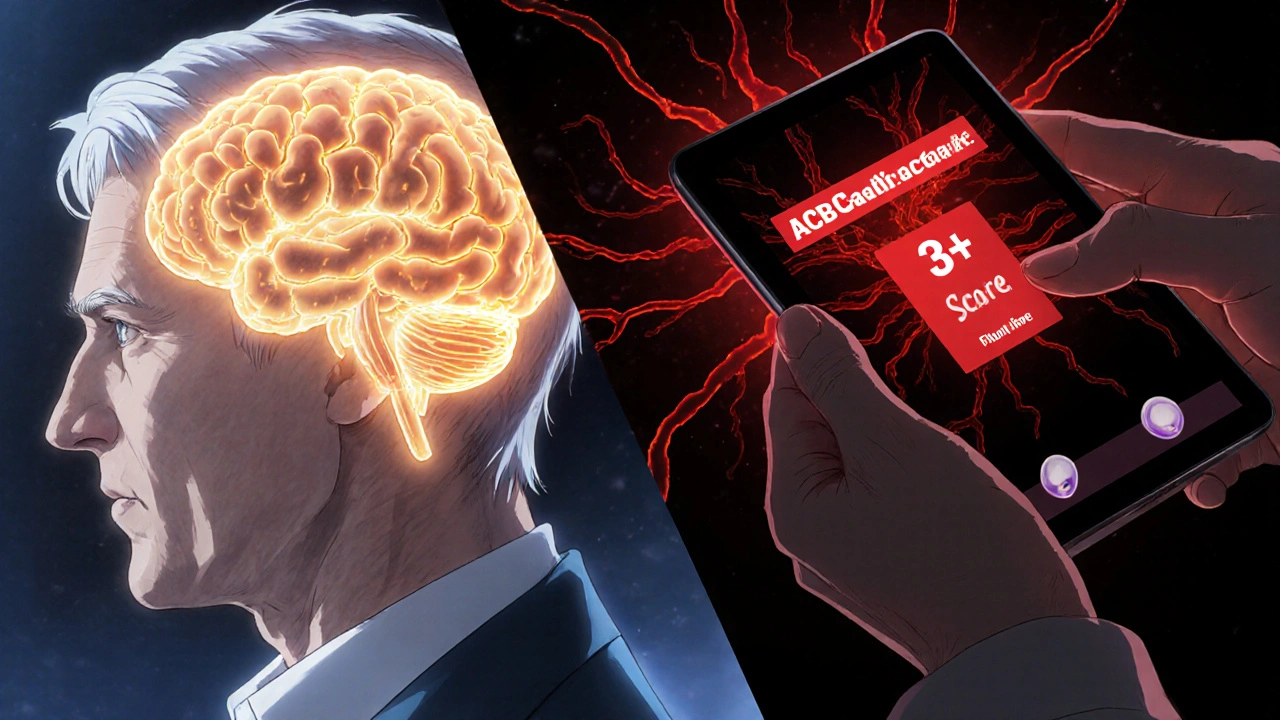Many older adults take medications every day to manage conditions like allergies, overactive bladder, depression, or insomnia. But what if some of these everyday pills are quietly damaging their brain? That’s the reality of anticholinergic burden-a hidden risk that’s linked to memory loss, confusion, and even dementia in seniors.
What Exactly Is Anticholinergic Burden?
Anticholinergic burden is the total effect of all medications that block acetylcholine, a key chemical in the brain that helps with memory, attention, and learning. It’s not about one drug-it’s about how many of these drugs a person takes, and how strong they are. Even if each pill seems harmless on its own, together they add up. Think of it like stacking weights: one small weight doesn’t hurt, but ten of them can crush you. The most common drugs with anticholinergic effects include:- Diphenhydramine (Benadryl)-used for allergies and sleep
- Oxybutynin (Ditropan)-for overactive bladder
- Amitriptyline-used for depression and nerve pain
- Hydroxyzine-another allergy and anxiety med
- Dimenhydrinate (Dramamine)-for motion sickness
How These Drugs Hurt the Brain
Acetylcholine isn’t just a random brain chemical-it’s the fuel for memory circuits. The hippocampus, which stores new memories, and the frontal lobe, which handles decision-making, are packed with receptors that need acetylcholine to work. When anticholinergic drugs block those receptors, the brain starts to slow down. Brain scans from the 2016 JAMA Neurology study showed that seniors taking medium-to-high doses of these drugs had 4% less glucose use in areas linked to Alzheimer’s disease. Glucose is the brain’s energy source-less use means less activity. Over time, this leads to physical changes: MRI scans from the Indiana Memory and Aging Study found that long-term users lost brain volume 0.24% faster each year than non-users. That’s not normal aging-it’s accelerated decline. And it’s not just structure. Function suffers too. In the ASPREE study of nearly 20,000 people over 70, each additional point on the anticholinergic burden scale meant:- 0.15-point greater yearly decline in executive function (planning, problem-solving)
- 0.08-point greater yearly decline in verbal memory
How Much Is Too Much?
Doctors now use the Anticholinergic Cognitive Burden (ACB) scale to rate drugs:- Level 1 (Mild): Diphenhydramine, hydroxyzine
- Level 2 (Moderate): Amitriptyline, oxybutynin
- Level 3 (Strong): Propantheline, clonazepam (when used long-term)

Real Stories, Real Consequences
On AgingCare.com, one caregiver wrote: “My mom was confused all the time-couldn’t remember what she ate for breakfast. We blamed aging. Then her doctor switched her from oxybutynin to a different bladder med. Two weeks later, she was back to herself. Said she felt like she’d woken up from a fog.” That’s not rare. The FDA’s adverse event database recorded over 1,200 reports of confusion, memory loss, or delirium linked to anticholinergic drugs in seniors between 2018 and 2022. Most were avoidable. Some families have seen dramatic improvements after stopping these meds. In the DICE trial, 286 seniors who had their anticholinergic drugs reduced saw their memory scores improve by 0.82 points on the MMSE test after 12 weeks. That’s enough to go from “mild cognitive impairment” back to “normal.”What’s Being Done About It?
Experts agree: this is one of the few modifiable risk factors for dementia we can actually act on. The American Geriatrics Society’s 2023 Beers Criteria now explicitly says: avoid strong anticholinergics in older adults. Pharmaceutical companies are responding. Johnson & Johnson stopped selling long-acting oxybutynin in 2021. Pfizer pushed out solifenacin (VESIcare), which doesn’t cross into the brain as easily. The European Medicines Agency banned dimenhydrinate in dementia patients. The FDA now requires stronger warning labels on all anticholinergic drugs. In 2024, the American Geriatrics Society launched a free mobile app called the ACB Calculator. You can type in a list of medications, and it instantly gives you a burden score. It’s simple, fast, and free. And the National Institute on Aging is funding a major new study called CHIME, which will follow 3,500 seniors over four years to see if reducing these drugs actually slows cognitive decline. Results are expected in 2028.What Can You Do?
If you or a loved one is over 65 and taking any of these medications, here’s what to do:- Make a full list of every pill, patch, or liquid you take-including over-the-counter ones like Benadryl or sleep aids.
- Ask your doctor: “Is this medication anticholinergic? What’s the ACB score?”
- Ask: “Is there a non-anticholinergic alternative?” For example:
- Instead of diphenhydramine for sleep: try melatonin or cognitive behavioral therapy
- Instead of oxybutynin for bladder issues: try pelvic floor exercises or mirabegron
- Instead of amitriptyline for pain: try duloxetine or gabapentin
- If you’re on a high ACB score (3+), don’t stop cold turkey. Work with your doctor to taper slowly. It can take 4 to 8 weeks for brain function to improve.
- Ask for a medication review at least once a year. Many doctors don’t do this unless you ask.

Why This Matters More Than Ever
We’re living longer-but not always better. Dementia is one of the biggest fears of aging. And while genetics and lifestyle play roles, we can’t ignore what’s in our medicine cabinet. A 2023 Lancet report called anticholinergic burden one of the top 10 modifiable risk factors for dementia. That means: if we cut it out, we could prevent 10-15% of dementia cases in older adults. That’s not a small number. That’s hundreds of thousands of people who could keep their memories, their independence, and their dignity. It’s not about fear. It’s about awareness. These drugs aren’t evil. They work. But they’re not harmless. And for seniors, the cost is too high.Frequently Asked Questions
Are all anticholinergic drugs dangerous for seniors?
Not all, but many are. The risk depends on the strength of the drug, how long it’s taken, and whether it crosses into the brain. First-generation antihistamines like diphenhydramine and bladder drugs like oxybutynin are especially risky because they affect brain receptors directly. Newer alternatives like solifenacin or fesoterodine have less brain penetration and are safer options. Always check the ACB score.
Can stopping anticholinergic drugs improve memory?
Yes, in many cases. Studies like the DICE trial show that after reducing or stopping these medications, seniors often see improvements in memory, attention, and clarity within 4 to 12 weeks. The brain can recover some function if the drug exposure stops. But recovery isn’t guaranteed-especially if damage has been long-term. The earlier you act, the better the chance of improvement.
Can I just stop taking my anticholinergic medication on my own?
No. Stopping suddenly can cause withdrawal symptoms like increased heart rate, dry mouth, constipation, or even rebound bladder problems. Some drugs, like tricyclic antidepressants, can cause dangerous spikes in blood pressure or seizures if stopped abruptly. Always work with your doctor to create a safe tapering plan.
What if I need the medication for a chronic condition?
You may still need it-but ask if there’s a safer alternative. For example, instead of amitriptyline for nerve pain, duloxetine has little to no anticholinergic effect. For overactive bladder, mirabegron works without blocking acetylcholine. For sleep, non-drug options like CBT-I (cognitive behavioral therapy for insomnia) are more effective long-term than diphenhydramine. Your doctor can help you weigh the benefits and risks.
How do I know if my meds have anticholinergic effects?
Use the free ACB Calculator app from the American Geriatrics Society. You can also ask your pharmacist or search the drug name on the Anticholinergic Cognitive Burden scale website (though the app is easiest). Common red flags: drugs ending in “-ine” (diphenhydramine, oxybutynin), or those labeled as “first-generation” antihistamines or tricyclic antidepressants.
Is this a problem only in the U.S.?
No. This is a global issue. The European Medicines Agency has issued warnings, and studies in Canada, Australia, and the UK show similar patterns. The problem is widespread because these drugs are cheap, widely available, and often prescribed without considering long-term brain effects. Seniors everywhere need to be aware.
Next Steps for Families and Caregivers
If you’re helping an older adult manage medications:- Keep a written or digital list of all meds-include doses and why they’re taken.
- Bring it to every doctor visit. Don’t assume the doctor remembers what was prescribed months ago.
- Ask for a “medication reconciliation” during annual checkups.
- Watch for signs: increased confusion, forgetfulness, trouble following conversations, or sudden mood changes.
- If you notice changes after a new prescription, don’t wait-ask if it could be anticholinergic.

